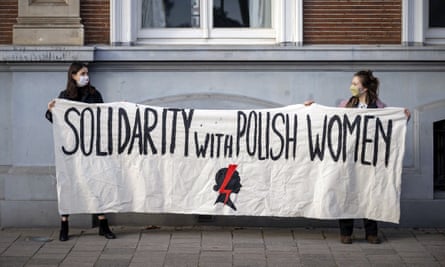Polish women are increasingly being forced to travel abroad to seek abortions even though a court ruling to tighten the country’s already strict laws has not yet coming into force, activists have said.
The constitutional court ruled in October that abortion was illegal even in cases where there were severe foetal abnormalities. Around 1,000 abortions a year – almost all of the country’s legal abortion procedures – are carried out for this reason.
Justyna Wydrzyńska, of the NGO Abortion Dream Team, which runs an advice hotline, said the group could already feel the chilling effect of the ruling. Calls to the hotline have increased, including from women who awaiting the results of tests on foetal abnormalities, and from many who are not pregnant yet but are alarmed by the ruling.
“They want to find out what choices they would have if they do get pregnant and find themselves in a situation of foetal abnormalities,” she said. The number of calls has gone up from 20 or 30 per day to around 100, with confusion over the ruling and the logistical difficulties of travelling during the coronavirus pandemic on people’s minds.
Surveys show that few Poles support tighter abortion restrictions, but ultra-conservative elements in the ruling coalition have long wanted such a move. The chairman of the Law and Justice party (PiS), Jarosław Kaczyński, said in 2016: “We will strive to ensure that even cases of very difficult pregnancies, when the child is certain to die, very deformed, still end up in a birth, so that the child can be baptised, buried, have a name.”

The ruling prompted huge protests in Warsaw and other cities, the scale of which surprised the government and possibly made it think twice about implementing the ruling of the tribunal, which has fallen under political influence under the PiS. The government is meant to publish tribunal rulings and pass them into law immediately, but nearly two months after the abortion ruling, this has not yet happened.
This uncertainty has also caused a headache for medical professionals. Many hospitals were already unwilling to perform even those abortions that were legal, and now access has become even harder.
“I heard a story about a medical doctor who was performing an abortion, and he was checking during the day whether the judgment had been published or not. The moment the judgment is published, you are committing a crime if you perform an abortion,” said Adam Bodnar, Poland’s human rights ombudsman.
The Abortion Dream Team together with several other NGOs launched a fund last year to help Polish women travel abroad, and since then it has helped more than 250 women travel to receive abortions, mainly to Germany, the Netherlands and Britain, where second trimester abortions are possible.
The recent tribunal decision has also prompted people in other neighbouring countries to take action.
“There was this energy in the air, we wanted to transform it into something real instead of just complaining by writing messages on cardboard,” said Jolanta Nowaczyk, a 28-year-old artist based in Prague. Nowaczyk and 10 others founded an organisation to provide safe abortion access to Polish women, inspired by the atmosphere at protests outside the country’s embassies.

Taking inspiration from Ciocia Basia, a Berlin-based collective helping Polish women access abortions in Germany, Ciocia Czesia has already provided access to 10 Poles in the five weeks since its founding, and more arrangements are being made every day.
Besides cooperating with clinics, the organisation also offers translation services, general funding, and transport across the border. “Each case is different: someone might need advice about which clinic to turn to, while others need financing and help with arranging the entire procedure,” said Nowaczyk.
Taking pills for a medical abortion, which can be done during the first trimester of pregnancy, is legal in Poland and is often seen as a better option than travelling for a surgical procedure. But this option is not always available. “Many do not have a safe place to take the pill, and for some the pill does not work,” said Nowaczyk.
Clinics in the Czech Republic have reported an increase in phone calls from Polish women enquiring about the logistics of receiving abortions there, despite the logistical difficulties of travelling at the moment. Some clinics reject Poles based on a law dating back to the communist period which states that only permanent residents can receive abortions, even though the government has said EU citizens should have the same rights.
At clinics that do provide the services to Polish women, most employees did not wish to speak publicly, both because of the legal ambiguity and for security reasons. “We have heard rumours about Polish pro-life groups attacking clinics which enable Poles to get abortions,” said a nurse from one such facility.
“Those who come to us are people who are often scared to undergo this procedure in Poland, and often don’t even tell their family. Some have already been rejected from Polish hospitals,” said Nowaczyk.








